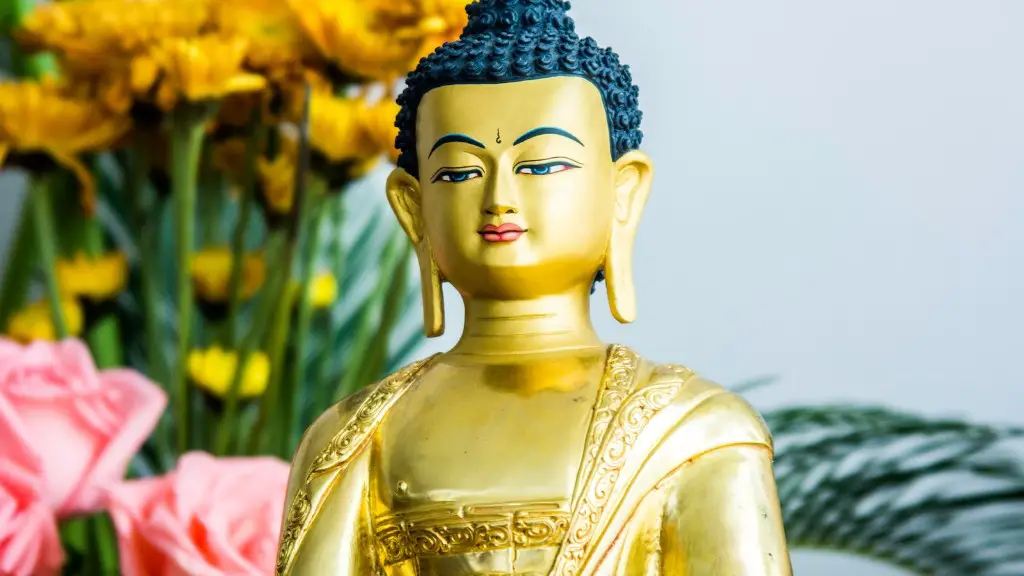Religion of Origin and Influences
Religion is deeply embedded in the culture and identity of India, but which religion is actually older, Hinduism or Buddhism? This is a debate that continues to engage scholars, with some experts believing Hinduism is the elder and others adamant that Buddhism arose first. Both religions share many common features, such as a philosophical core, the use of mantras, and a veneration of the divine. However, their histories, cultural influences, and individual philosophies would suggest that they each evolved separately, although neither has a unquestionable claim to being “first”.
Hinduism is considered by scholars to be the oldest organized religion in the world and often linked with the Vedic religion which is said to have flourished in India from 1500 BCE to 500 BCE. The philosophy and values of Hinduism developed from the Vedic religion and have significance in modern times. The Hindu faith has consistently influenced the language, literature, and culture of Indian people for almost four thousand years. The Hindu tradition is characterized by specific ethical codes, religious doctrines, and spiritual practices, focused around the belief in a universal divine being, Brahman.
Modern Buddhism, on the other hand, began in the 6th century BCE in India as a spiritual-based revolutionary movement of monk devotees, known as the “Dharma Revolution”. The teachings of Buddha, which became recognized as a religion, absorbed and blended with local cults and traditions to create its own entity. Buddhism beliefs led to a holistic and individualized approach to spiritualism, quite different from the tangible-aesthetic-based practice of Hinduism. Its expansive acceptance by devotees and its timely emergence as an anti-Hindu institution are some of the core features that define its existence.
By examining the foundations of both Hinduism and Buddhism, one can observe significant differences in their beliefs, concepts, and practices. Starting from their religious and spiritual natures, Hinduism’s focus on gods and grand rituals, especially focused on worship of deities, is different from Buddhism’s more personalized and individualized approach. Buddhism’s rejection of Vedic teachings, the Hindu caste system, and the authority of Hindu scripture make it difficult to classify it as a product of Hinduism.
Cultural Considerations
Culturally, Hinduism and Buddhism have been influential in social life in India. Hinduism is believed to have outgrown its rigidity and traditionalism and evolved differently over the centuries. Its superstitious beliefs centered on gods and goddesses, the worship of idols and constructed temples which encourages cults, and the institution of caste system were some of the influential aspects of Hinduism that still shape Indian society.
Buddhism also played an important part in the Indian cultural heritage, as it further developed ideas of compassion, community service, and justice, among many others. Buddhist scriptures and scholars tried to interpret Buddhist principles in ways that were accessible and understandable to the common people. This enabled them to make Buddhism a part of their daily life and ultimately facilitate the adoption of Buddhism by Indians. It was even proposed by some scholars that Buddhism’s stance on universalism and non-violence became mainstream and promoted political and social change.
Buddhism also brought with it new ideas on reincarnation which were embraced by many Hindus. The idea of karma, fate and the caste system is deeply entwined in Hinduism and accepted by many practiced Buddhists, making it difficult to definitively differentiate between the two religions.
Spread and Influence of Hinduism and Buddhism
The spread of Hinduism began with the migrations of the Aryan people from the north, followed by the establishment of Vedic religion in the Indus Valley. After centuries, the philosophical and spiritual aspects of Hinduism were codified in the Sanskrit language. Once written, Hinduism became the ancient religion of India and spread across the world, directly and through the influence of empires and advances in the technologies of communication and travel.
Buddhism, on the other hand, spread geographically in the context of politics and trade between rulers. Buddhist missionaries claimed King Asoka Maurya of India was a major supporter of their faith and its spread throughout India, and also exported it to countries like Sri Lanka, Burma, Pakistan, Thailand, China, and other places in East Asia.
The advent of Buddhism caused a schism of Hinduism’s caste-based hierarchy and provided refuge to many in India’s lower castes. On the other hand, Hinduism had a significant impact on Buddhism, as some scholars believe that Hinduism had an influential role in the development of Buddhist doctrines, such as the theory of karma and the rebirth of the soul.
Uniqueness of Hinduism and Buddhism
The culture and beliefs of Hindus and Buddhists are unique and vast. Hinduism is combination of vast and infinitely varied beliefs, traditions, and practices, a varied, living and dynamic faith with no single founder, no central authority, no single scripture, and no set of doctrines accepted by all Hindus. Buddhism, on the other hand, was developed in India and became an independent faith with an important monastic tradition. Though Buddhism was born from Hindu culture and philosophy, it is quite distinct from its sister religion, as it places less emphasis on rituals and gods, and advocates the practice of meditation to attain a pure inner peace.
The respective religions also provide choice and flexibility: Hinduism offers multiple paths or philosophies such as Shaivism, Vaishnavism, and Shaktism, to name a few, while Buddhism provides its followers the choice of various levels of enlightenment, taken at either the individual or communal level.
Hinduism talks about the four paths of realization so that individuals can choose the one that best fits their spiritual progress: Bhakti Yoga, the path of love and dedication; Jnana Yoga, the path of knowledge and wisdom; Karma Yoga, the path of action and services; and Raja Yoga, the path of mental discipline and self-control. Buddhism, on the other hand, invites followers to break the cycle of suffering through the Noble Eightfold Path, a personal journey to peace and enlightenment.
Conclusion
Despite having several similarities in customs and beliefs, Hinduism and Buddhism are two entirely separate religious phenomenons with their own distinct traditions, beliefs and teachings. The precise origin of Hinduism is debatable as there is no single set of scriptures or agreed upon set of teachings, and it is difficult to clearly specify which practice came first. It is believed that Buddhism grew out of various Indian cultural and philosophical roots and incorporated ideas from Hinduism while controlling its spread.
Though difficult to distinguish or agree on, research shows that Hinduism is a very ancient religion, while Buddhism originated in India with a more modern approach to spiritualism. Though the two religions share some similarities, they are two distinct and powerful spiritual systems that continue to shape Indian culture and beliefs, and have an influence that extends far beyond India’s borders.
Relevance In Modern Times
Today, Hinduism and Buddhism remain influential forces in Indian life and culture, as well as in other parts of the world. Hinduism is still the predominant religion in India, with a population of over one billion followers worldwide, which is second only to Christianity in terms of the number of adherents. Buddhism is the fourth-largest religion, followed by more than 500 million Buddhists throughout the world.
Hinduism and Buddhism still hold powerful influences in human attitudes and behavior worldwide, with both branches continuing to grow and evolve in modern times. With Hinduism providing a spiritual refuge and Buddhist philosophy providing inner peace and enlightenment, practitioners of both religions are able to enjoy a deeply spiritual and meaningful life. In spite of their differences, both Hinduism and Buddhism have much to offer the human spirit, and for many, there is no better place to find solace than these ancient faiths.
Relation To Other Religions
Although Hinduism and Buddhism have been distinct from other religions, they have borrowed significant aspects from other long-established religions. They are perceived as two related religions that have borrowed some elements from each other and occupy a combined space in the religious landscape. For instance, the principles of karma and reincarnation, which originated in the Hindu faith, have been extensively borrowed and adapted by Buddhism and other beliefs. Similarly, certain symbols or concepts that are associated with Hinduism, such as mandalas, gods, and dedicatory services, have been adopted by some forms of Buddhism.
Due to their long-established presence in India and other parts of the world, Buddhism and Hinduism have both substantially influenced other religions and philosophies. The influence of Buddhism, for instance, can be found in the non-theistic philosophical perspective of Jainism, in the practice and beliefs of Zoroastrianism, and even in the Judaeo-Christian faith. Hinduism has also strongly impacted both Jainism and Sikhism, and its influence can also be seen in western religion, such as the notion of “nirvana” in Christianity.
The relationship between Hinduism and Buddhism is complex, coexisting, and sometimes overlapping. However, their influences are profound and pervasive, transcending the boundaries between cultures and beliefs. As two distinct religions, both Hinduism and Buddhism continue to inspire spiritual growth and encourage their adherents to live a meaningful, fulfilling life.



